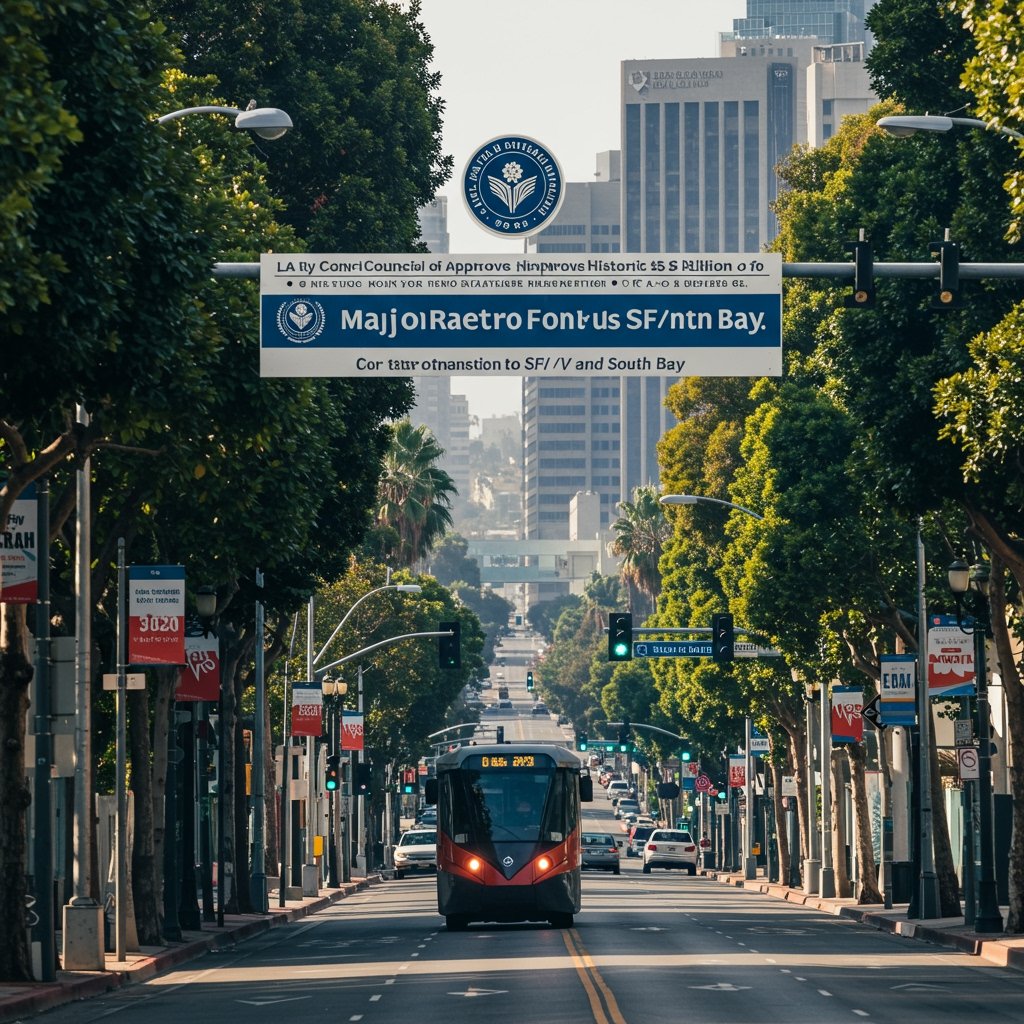LA City Council Greenlights $5 Billion Bond for Sweeping Metro Rail Expansion
Los Angeles, CA – In a pivotal decision poised to reshape the future of public transit in Southern California, the Los Angeles City Council voted today, June 8, 2025, to formally approve a $5 billion municipal bond measure. This massive investment is earmarked specifically to fund critical expansions for the region’s Metro Rail system, targeting key underserved areas with ambitious new rail lines.
The measure, which passed with a decisive 12-3 vote, represents a significant commitment to the second phase (Phase 2) of Metro’s long-term, ambitious public transit development plan. The primary focus of this phase is the crucial task of extending rail lines into the densely populated and transit-hungry regions of the San Fernando Valley and the South Bay. These areas, known for challenging traffic conditions and increasing demand for viable transportation alternatives, stand to benefit substantially from enhanced rail access.
The Vote and the Bond: A Landmark Decision
The 12-3 vote underscores broad support within the City Council for prioritizing infrastructure development and investing heavily in public transportation as a solution to Los Angeles’s perennial traffic woes. While the majority championed the measure as a necessary and forward-looking step, the three dissenting votes highlighted persistent concerns regarding the scale of the financial commitment and the complexities inherent in major infrastructure projects.
A municipal bond, like the $5 billion bond measure approved today, is a debt security issued by a state or local government to finance capital projects. In this case, the City of Los Angeles, likely in coordination with the Los Angeles County Metropolitan Transportation Authority (Metro), will issue bonds to raise the necessary funds. These bonds are typically repaid over many years, often decades, through various revenue sources, which can include dedicated sales taxes, property taxes, or farebox revenue, depending on the specific structure of the bond measure. The $5 billion figure represents one of the largest single bond authorizations for transportation infrastructure in the city’s history, signaling the magnitude of the planned expansion.
Scope of Phase 2: Connecting Vital Regions
Phase 2 of the Metro development plan is designed to build upon existing infrastructure and create more seamless connections across the vast Los Angeles basin. Extending lines into the San Fernando Valley aims to provide commuters with a reliable, high-capacity alternative to navigating congested freeways like the 101 and 405. Potential routes and technologies within the Valley could range from light rail extensions to potential subway segments, connecting major residential and commercial hubs.
Similarly, the expansion into the South Bay is crucial for improving access to key employment centers, residential communities, and potentially connecting to other regional transit networks. This extension is expected to ease pressure on south-county freeways and provide vital links for communities that have historically had less direct access to the core Metro Rail network. While specific routes and project details for these extensions are still in the detailed planning and environmental review stages, the bond funding provides the critical financial impetus needed to move these long-envisioned projects from concept to reality.
Support and Anticipated Benefits
The approval was met with strong praise from key stakeholders. Mayor Karen Bass lauded the decision, calling it a vital step towards creating a more sustainable and efficient transportation network for Los Angeles residents. “This bond measure is an investment in our future,” Mayor Bass stated in a press release following the vote. “Expanding our Metro system is essential for reducing traffic congestion, improving air quality, and ensuring equitable access to jobs and opportunities across our city.”
Transit advocates were equally enthusiastic. Groups representing commuters, environmentalists, and urban planners highlighted the potential benefits, including significant reductions in vehicle miles traveled, decreased greenhouse gas emissions, and a boost to the regional economy through job creation during construction and improved accessibility for businesses and workers. They emphasized that accessible public transit is fundamental to addressing climate change and promoting social equity.
Concerns and Challenges
Despite the celebratory tone from supporters, the decision was not without its critics. Concerns were primarily centered on two major points: the long-term financial burden placed upon the city and taxpayers, and the feasibility of project timelines and budgets for such complex undertakings.
Opponents voiced worries about the city taking on substantial debt, particularly in the face of potential economic uncertainties. They questioned the source of repayment funds and the potential impact on other city services or future tax rates. The sheer scale of a $5 billion bond raises questions about the city’s debt capacity and fiscal health over the coming decades.
Furthermore, past experiences with large-scale infrastructure projects in Los Angeles and elsewhere have often seen projects exceed initial budgets and timelines. Critics pointed to these historical challenges, expressing skepticism about whether the San Fernando Valley and South Bay extensions could be delivered on schedule and within the allocated $5 billion. They argued for more phased approaches or alternative, potentially less costly, transit solutions.
Financial Outlook and Next Steps
The approval of the bond measure unlocks the financial pathway for the Phase 2 expansions. Funding from the bond is expected to become available in late 2025. This timing is crucial, as it will allow Metro and the City to transition from planning stages to actionable steps.
The immediate next phase involves the commencement of preliminary engineering work. This includes detailed site analysis, environmental impact assessments, further refinement of route alignments, and initial design concepts. While construction is still some time away, the availability of funding by late 2025 is a critical milestone that permits the essential preparatory work to begin, setting the stage for eventual groundbreaking on these transformative transit projects.
The City Council’s vote today marks a monumental moment for Los Angeles’s transportation future. While challenges related to finance and execution remain, the approval of the $5 billion bond firmly establishes the expansion of Metro Rail into the San Fernando Valley and South Bay as a top priority, signaling a long-term commitment to building a more connected and less car-dependent metropolis.





